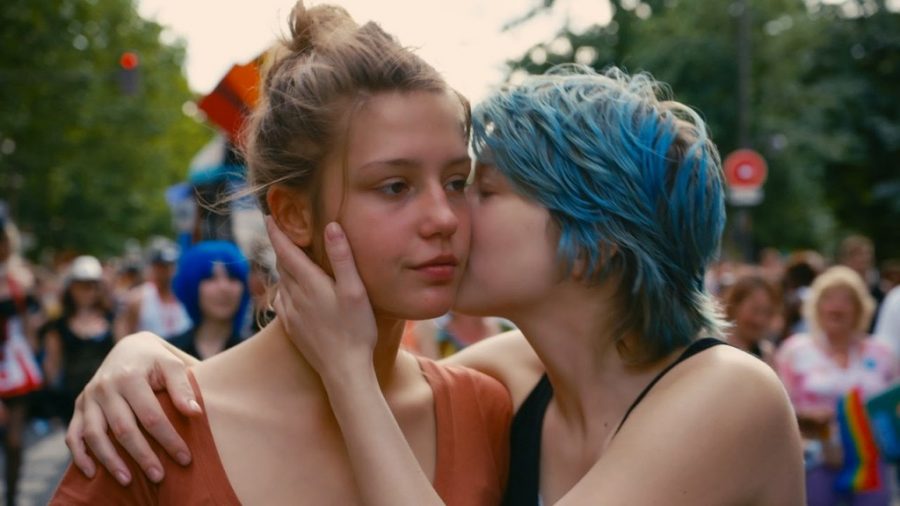
 White actor Jim Sturgess played an Asian character amidst criticism in “Cloud Atlas,” this role generated nothing near the media circus that “Dancing with the Stars’” Julianne Hough created with her blackfaced, “Orange is the New Black” Halloween costume. As Hough’s get-up was disrespectful, Sturgess’s performance was not. Could it actually be that artistic license and performance quality played parts in the severity of critics’ reactions?
White actor Jim Sturgess played an Asian character amidst criticism in “Cloud Atlas,” this role generated nothing near the media circus that “Dancing with the Stars’” Julianne Hough created with her blackfaced, “Orange is the New Black” Halloween costume. As Hough’s get-up was disrespectful, Sturgess’s performance was not. Could it actually be that artistic license and performance quality played parts in the severity of critics’ reactions?
The idea of “gayface,” straight actors portraying gay characters, became mainstream after high profile films like “Brokeback Mountain,” “Milk,” and their precursor “Philadelphia,” were all box office hits. The most steadfast argument against gayface, as with blackface, is that gays should get the roles for the purposes of employment (as Asian actors should get Asian roles). While Sean Penn fabulously portrayed Harvey Milk, an out gay actor sat out of work. But isn’t it the performance that matters? We’d like to think so.
Gay critic and Sociologist Suzanna Danuta Walters acknowledges in the May 23rd “Chronicle of Higher Ed. Review” that although celebration is better than denunciation, and the perception of homosexuality has undoubtedly improved in the first world recently, along with this progress has come some hindrance. It sounds bizarre that tolerance could be considered a negative, but Walters is concerned about the rise of “tolerance.” She presents tolerance today as something that has become de rigueur, a badge-of-honor mentality, as has not just having gay friends, but making sure everybody knows you do.
To Walters, “to tolerate” homosexuality is like tolerating a nasty cold, or an annoying coworker. Expressing tolerance is truly just a selfish act. Using her words, she says we don’t tolerate great sex, a good book, or a sunshine-filled day. "Blue is the Warmest Color" is gayfaced, and has a graphic lesbian sex scene that caused controversy. But why? Because it was a sex scene, or because it was a gay sex scene? Although graphic, it is not raucously audacious. Although “Blue” did win the 2013 Palme d’Or and was already known, one thing is certain, the film’s popularity soared because of the controversy surrounding it.
Stars Adéle Exarchopolous and Léa Seydoux cried out they had been pushed further than they wanted to go on screen. Seydoux said she felt like a prostitute. But would the actresses have complained had they been openly gay? Would critics have complained? Would an un-simulated, straight sex scene of the same length and magnitude have even been possible to pull off without condemning the film to pornographic? (As it is, the sex isn’t totally real, according to The Huffington Post).
The New York Time’s critic Mahohla Dargis slammed director Abedlatif Kechiche for exploiting the actress’ bodies splayed, parted, open-lipped as beyond necessary to capture the females’ consciousnesses. But exploitation is this just baseline sexual, not homo or hetero, The sex appeal of the women surely added to the film, so maybe Kechiche’s flaunting Adéle’s ass sold tickets? So what. There is nothing strikingly gay about that.
Suzanna Walters would probably say that even to be discussing the gayface issue it to fetishize something that is de facto totally ordinary. It is not clear what she would decree about the employment issue. Overall Walter’s makes a legit argument, but sexuality is a pretty big issue to simply ignore. So then, are blackface and gayface even comparable issues?
In “Blue’s” case, filmmakers controlled the actors, so if they to refuse to obey, as Seydoux claimed, they’d get fired. And no right-minded, career oriented actor is going to walk on out on a project of magnitude, so the actor gets trapped. This sounds like an issue for the French actor’s union. Both Adéle Exarchopolous and Léa Seydoux gave great performances, despite the unnatural three hour endurance test “Blue” puts the audience through, and so isn’t the performance what matters? No, because we showed we care about off-stage controversy just as much, and this is why great performances, at least for now, are just not enough, and playing gayface, and blackface, remain controversial.